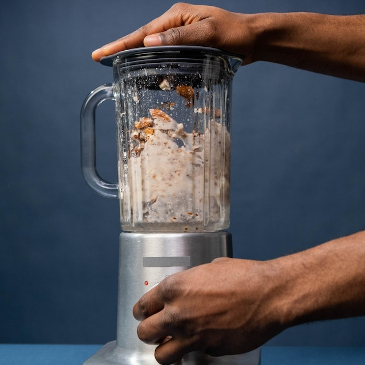Plant based milks are consistently gaining market share from their dairy counterparts and while oat milk appears to have eclipsed almond milk in popularity [1], it is still a very popular dairy free option. But how much unsweetened almond milk is too much on a daily basis? Can you have too much of a good thing?
How Much Unsweetened Almond Milk Is Too Much?
More than a couple of cartons of unsweetened almond milk every day is probably too much, at least when it comes to the commercial products. Mainly due to the additives included in there. But if you make your own almond milk you can choose to avoid the chemicals and really go to town!
Watch: Caitlin Shoemaker compares the Almond Cow with her Vitamix
(Caitlin’s excellent informative video gives you the real lowdown!)
It’s Mostly Water So What’s The Problem?
Most unsweetened commercial almond milks don’t contain many almonds. You’re looking at between 2-8% almond content in the majority of products out there.

The rest is water and additives.
There are, of course, some brands with a higher percentage almond content and the organic versions usually fall into this category.
But taking a very popular brand as an example, the Alpro unsweetened almond milk contains just 2.3% almonds (as of this writing). The rest of that carton is made up of water, a calcium supplement, small amounts of stabilisers/emulsifiers and vitamin supplements.
Most brands, in the UK at least, have stopped using carrageenan now which is probably best. In the article “Can almond milk mess up your stomach?” we look at why this controversial additive may be responsible for gastrointestinal side effects in a small minority of consumers.
It’s difficult to find actual stats on percentage compositions of these products but we can safely assume 95%+ of that carton of almond milk is just water … very expensive water!
So is it ok to glug down cartons of the stuff every day?
Intolerances Notwithstanding, 2L Should Be Fine
It goes without saying, those with an almond allergy definitely need to avoid almond milk.
 But unless you have an intolerance to the stabilisers like guar gum and emulsifiers like soy lecithin, a carton of commercial almond milk a day will likely cause you no problems at all.
But unless you have an intolerance to the stabilisers like guar gum and emulsifiers like soy lecithin, a carton of commercial almond milk a day will likely cause you no problems at all.
In fact, seeing as it is mostly water, 2 or even 3 cartons of unsweetened almond milk is probably not too much on a daily basis. I think to be on the safe side, 2L is a sensible limit.
Although, unless you’re addicted to the stuff, you’re probably unlikely to ever get through more than a carton a day. At this level of consumption you really don’t need to worry that you’re consuming too much.
Obviously the sweetened version is a different story. In some of the products out there you’ll find more sugar than almonds! So common sense should tell you to limit your consumption of sweetened almond milk.
The ‘Barista’ varieties of almond milk contain extra additives to improve the consistency and behaviour in your morning coffee. Some contain a vegetable oil and most will have a little sweetener in there – either a refined sugar or a fruit juice.
But again, I’d wager you’re unlikely to be drinking a carton of Barista almond milk every day … unless you’re a real coffee fiend! Although I do quite like a bowl of cornflakes with these ‘creamier’ products 🙂
Is Almond Milk a Goitrogenic Food?
We can’t publish this piece without mentioning the goitrogenic question.

Some prominent websites are making sensationalist claims that almond milk should be treated with care because of the potential interference with thyroid function.
Frankly, these websites should know better and I have to ask what their real motive is.
This is one of the arguments often used by the anti-vegan brigade to sow the seeds of doubt in impressionable minds!
One post in particular keeps popping up in my research. Penned by Aayushi Gupta and published on the Health Shots website, you may very well have seen it in your travels.
Let’s just put this one to bed right now …
While almonds are indeed considered a goitrogenic food, they appear well down the list of foods in this category. In fact, they don’t even appear on this comprehensive list from HealthLine.
Needless to say, you would have to eat a very large amount of unprocessed almonds every day before it starts messing with your thyroid.
Further, we’ve already established that in the average carton of commercial almond milk, the actual almond content is vanishingly small. So you’d need to drink many gallons of the stuff every day before any trace of a goitrogenic effect became apparent.
In fact, due to the large water content, you’d likely experience hyponatremia before any problems with interference of your thyroid function!
So I can only conclude that our health expert, Aayushi Gupta, with 2 years experience in the wellness industry either didn’t do her research or is knowingly spreading misinformation.
Drink a Lot Of Almond Milk? Go Homemade
Depending on how much you drink, as a straight functional replacement for cow’s milk, I’d recommend going with an organic commercial almond milk. There’s far fewer additives in these products.
 The only thing you need to be aware of is organic plant milks usually don’t have vitamins and minerals added. So nutritionally, it is far from a straight replacement.
The only thing you need to be aware of is organic plant milks usually don’t have vitamins and minerals added. So nutritionally, it is far from a straight replacement.
Also the organic varieties do tend to ‘split’ more in tea and coffee.
But the real game changer is when you start making your own. It’s no surprise that plant milk makers have become super popular in the last few years.
Many people don’t want to consume guar gum, soy lecithin, dipotassium phosphate … the list goes on. To be honest, it is somewhat of a real-time chemical experiment we’re undertaking as plant milks gain market share.
Then again, one could convincingly argue this observation extends to much of the food we eat today. Ultra processed food is everywhere and some of it is loaded with way more additives than the carton of almond milk in your fridge.
If you can afford the initial investment in a plant milk maker and you use it regularly you will benefit from a much more nutritious beverage and it will pay for itself over time.
We used to make a lot of nut milks and I can confirm, it is absolutely delicious stuff!
Conclusion: All Things In Moderation
Consuming too much of anything, let alone a good thing, is unwise. Whatever your reasons for choosing almond milk, it’s a good idea not to go overboard.

Having said that, I’d happily advise you could drink homemade organic almond milk until the (almond) cows come home! Assuming you’re not adding your own ‘improvers’ in there.
Almonds are a highly nutritious nut with a whole myriad of health benefits. When you consider a homemade milk may contain 30-40% almonds then that creamy white loveliness is going to do you some good!
So to wrap this up, I’d say more than a couple of litres of commercial almond milk every day is probably too much to consume, just because you want to limit your intake of additives.
But you can really go to town with the organic homemade version and pretty much drink as much as you want, allergies notwithstanding of course.
We highly recommend the MioMat 8 in 1 Plant Milk Maker for a good all-round entry level unit.
I hope we’ve helped to answer your question today and if you would like to ask us anything related to the article please leave a comment below. A social share is always appreciated too.
Want to be the first to know when we publish new content? Just sign up to our new post alerts and it shall be done 🙂
Thanks so much for reading and have a peaceful day.
Rohan.
[1] – https://vegnews.com/2023/1/2022-oat-milk-biggest-year

Hey Rohan,
Thanks for debunking the almond milk goitrogenic theory. Was sad when I originally read it on the other site because I enjoy almond milk quite a bit! You provided solid info. Glad that there is real journalism out there.
Thank you for your comment Nick and I’m glad we could help put your mind at rest a little on this one. There is an awful lot of misinformation out there. Like I say, you’d have to consistently drink gallons of almond milk to see any sort of goitrogenic effect. In this study on thyroid dysfunction almonds are not even mentioned.
I should add however that I am not a doctor and all the info on this website is my personal opinion. You should always consult your medical professional if you have any concerns about your health.